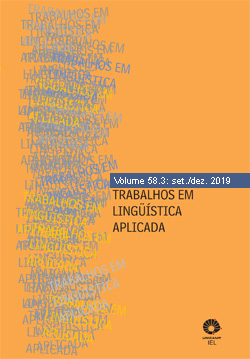Abstract
Based upon Foucauldian and Derridean post-structuralist philosophy of language, Sousa Santos and Menezes de Souza’s sociological approaches to language, Hall’s productive conceptualization of culture and on Mirzoeff, Stam and Shohat’s visual studies, this paper seeks to engage with discussions on visual culture, cultural translation and language education. Of qualitative/interpretative nature, this reflection is divided into five main sections: in the introduction, it presents philosophical and sociological approaches to (visual) language and culture. Section one problematizes visual culture by means of the genealogy of invisible bodies. Next section evolves from the grammar-translation model to cultural translation in visual culture. Then, it revisits and deconstructs dominant literacy models through cultural translation. Finally, this genealogical perspective towards the visual shows how the traditional historical formations have taken over back again the political and educational scenarios in our country, and thus sadly promoted a politics of manipulation and alienation.
References
BAKHTIN, M. (Volosinov). (1981). The dialogic Imagination. Austin: University of Texas.
BLOMMAERT, J.; RAMPTON, B. (2011) Language and Superdiversity. Diversities, vol. 13, n. 2, UNESCO.
DERRIDA, J. (1978). Structure, Sign and Play in the Discourse of the Human Sciences. In (DERRIDA, J.). Writing and Difference, trans. Alan Bass. Chicago: University of Chicago Press, pp. 278-93.
GARCÍA, O. & WEI, L. (2014). Translanguaging: language, bilingualism, and education. New York, NY: Palgrave MacMillan.
HALL, S. (1997). Representation: Cultural representation and Signifying Practices. London, Thousand Oaks, New Delhi: Sage Publications.
LATOUR, B. (1993). We Have Never Been Modern. trans. Catherine Porter. Harvard University Press. Cambridge, Massachusetts.
McCLINTOCK, A. (1998). Soft-Soaping Empire. Commodity Racism and Imperial Advertising. In The Visual Culture Reader. MIRZOEFF, Nicholas, ed. London: Routledge, pp. 304-316.
MENEZES DE SOUZA, L. M. T. (2004). Hibridismo e Tradução Cultural em Bhabha. In ABDALA JUNIOR, Benjamin (Org.). Margens da Cultura: mestiçagem, hibridismo & outras misturas. São Paulo: Boitempo, pp. 113-133.
MENEZES DE SOUZA, L. M. T. (2007). CMC, hibridismos e tradução cultural: reflexões. Trab. linguist. apl., Campinas, v. 46, n. 1, pp. 09-17.
MENEZES DE SOUZA, L. M. T. (2009). Gaza 2009: notes on critically reading conflict. Critical Literacy: Theories and Practices, 3:1, pp. 86-89.
MENEZES DE SOUZA, L. M. T. (2011). Engaging the Global by Resituating the Local (Dis)locating the Literate Global Subject and His View from Nowhere. In: Oliveira Andreotti, V.; Souza, L. M. T. M.. (Org.). Postcolonial Perspectives on Global Citizenship Education. Londres: Routledge, pp. 68-86.
MIGNOLO, W. D.; SCHIWY, F. (2002). Beyond Dichotomies: Translation/ Transculturation and the Colonial Difference. In MUDIMBE-BOYI, E. (Ed.). Beyond Dichotomies: Histories, Identities, Cultures, and the Challenge of Globalization. Albany: State University of New York Press, pp. 251-286.
MIRZOEFF, N. (1998). The Visual Culture Reader. London: Routledge.
MORRA, J; SMITH, M. (eds) (2006). Visual Culture: critical concepts in media and cultural studies. London and New York: Routledge.
NGUGI, wa T. (1986). Decolonizing the Mind: the politics of language in African literature. Nairobi: Heinemann Kenya.
PETERS, M. A.; BIESTA, G. (2009). Derrida, deconstruction, and the politics of pedagogy. New York: Peter Lang.
ROBERTSON, R. (1995). Glocalization: Time-Space and Homogeneity-Heterogeneity, in M. FEATHERSTONE et al., Global Modernities. London: Sage, p. 25-54.
ROGOFF, I. (2002). Studying Visual Culture. In: MIRZOEFF, N (ed.). The Visual Culture Reader. 2nd Ed. London: Routledge, pp. 24-36.
SAID, E. (1993). Culture and Imperialism. New York: Alfred A. Knopf.
SANTOS, M. (2002). O país distorcido: o Brasil, a globalização e a cidadania. São Paulo: Publifolha.
SEIDMAN, S. (1994). The Postmodern Turn: new perspectives on social theory. Cambridge: Cambridge University Press.
SCHWARTZ, S. (1996). Brazilian Ethnogeneses: Mestiços, mamelucos and pardos. In: GRUZINSKY, S. & WACHTEL, N. (ed.). Le nouveau monde, Monde nouveau: L´experience américaine. Paris: L´École des Hautes Études em Sciences Sociales.
SHLOWIY, A. A. (2014). Texting Abbreviations and Language Learning. International Journal of Arts and Sciences, 07(03), pp. 455-468.
SHOHAT, E.; STAM, R. (2002). Narrativizing visual culture. Towards a polycentric aesthetic. In: MIRZOEFF, N. (Ed.) The Visual Culture Reader. 2 ed. London & New York: Routledge.
SOUSA SANTOS, B. (2018). The End of the Cognitive Empire: the coming of age of epistemologies of the South. Durham and London: Duke University Press, 2018.
TODD, S. (2009). Towards an imperfect education: facing humanity, rethinking cosmopolitanism. London: Paradigm Publishers.
TODD, S. (2016). Toward an Imperfect Education: Facing humanity, Rethinking Cosmopolitanism. New York: Routledge.
O periódico Trabalhos em Linguística Aplicada utiliza a licença do Creative Commons (CC), preservando assim, a integridade dos artigos em ambiente de acesso aberto, em que:
- A publicação se reserva o direito de efetuar, nos originais, alterações de ordem normativa, ortográfica e gramatical, com vistas a manter o padrão culto da língua, respeitando, porém, o estilo dos autores;
- Os originais não serão devolvidos aos autores;
- Os autores mantêm os direitos totais sobre seus trabalhos publicados na Trabalhos de Linguística Aplicada, ficando sua reimpressão total ou parcial, depósito ou republicação sujeita à indicação de primeira publicação na revista, por meio da licença CC-BY;
- Deve ser consignada a fonte de publicação original;
- As opiniões emitidas pelos autores dos artigos são de sua exclusiva responsabilidade.


